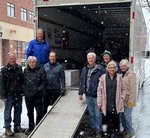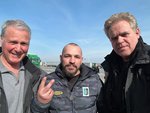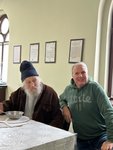




Early last week, Ody Norkin was busy ferrying boxes of surgical gauze, wound dressings, disinfectant and other medical supplies from the back of his car to a spacious, cluttered office in East Lansing.
The bland music echoing in the lobby of the Marriott hotel complex on a sleepy Monday morning belied the urgency of the need for these supplies, half a world away.
A few days earlier, Norkin was looking at bombed-out buildings and bullet-riddled cars in the streets of Irpin, near the Ukrainian capital of Kyiv.
Norkin, vice president of the Michigan Flyer bus service, went to Kyiv to deliver a fully equipped ambulance to Ukraine — the fourth ambulance he’s shepherded across the border in the past year, with the help of local contacts and a growing network of Lansing-area donors.
Back in East Lansing, he was readying a fresh load of supplies for shipment to the war zone. Some were donated by local hospitals; others were paid for by donations from the Greater Lansing Jewish Federation, other Jewish and non-Jewish groups, foundations and private businesses.
A year into the brutal conflict, Norkin is still learning the ropes. One wall was piled with boxes of personal protective equipment, mostly gowns and masks.
Those boxes would not go.
“The folks on the ground in Ukraine told us, ‘Don’t bother. We’re in a war zone,’” Norkin said. “They don’t need gowns and masks. They need burn care, wound care, surgical equipment, disinfectant, anything to do with open wounds.”
Coiled between the stacks of boxes were a length of rubber hosing and a hydraulic jack, donated by a local fire department, used to rescue people pinned by steel and concrete in bombed-out buildings.
Those were going.
From a week to a year
A year ago, people told Ody Norkin it would be a fool’s errand to bring an ambulance into Ukraine, even if he succeeded. Russian troops had already occupied the port city of Kherson on March 2. The war would be over by the time he found a vehicle, purchased it and cleared all the bureaucratic and logistical hurdles, he was told.
Privately, Norkin feared they were right — that Odessa might fall within the week.
“I pictured myself returning to East Lansing and saying, ‘Well, I tried,’” he said.
Risk was a more obvious argument against going into a war zone, but Norkin hates hero talk.
Fortunately, Okemos attorney David Mittleman, a donor and facilitator who has worked closely with Norkin on getting humanitarian aid to Ukraine, was glad to talk about that.
“We’ll never know the full extent, because we’ll never pry it all out of him,” David Mittleman said. “People told him it’s too dangerous — and it’s still dangerous — but that doesn’t slow him down. Ody has put his life on the line.”
Giving a speech about how and why he just had to try, no matter what, isn’t Norkin’s style.
“It comes to him naturally, with his passion about what happened to his grandparents, to do what he could do,” Mittleman said. “I consider him a humble hero.”
Norkin’s grandparents, Sara and Moshe Norkin, were murdered in a massacre in Odessa in 1941.
“There’s no gravesite, no record,” Norkin, 68, said. “Just 140,000 victims. No information on who, when, where, why, other than it was a reprisal by the Romanian army, who were on Hitler’s side.”
Norkin came to the United States in 1978 after serving in the Israeli Army during the 1973 war. His father, Aaron, a graduate of Odessa Technical School, was arrested by the Russians for being a member of a Zionist Youth Group. He later escaped to British Mandate Palestine, arriving by 1927. Norkin’s grandparents were murdered in Crimea in 1941, while other family members were deported to Siberia.
Looking out from his hotel room in Kyiv two weeks ago, Norkin gazed at narrow, tree-lined streets his father likely knew from his many visits to the capital from Odessa.
It was Norkin’s fifth trip to Ukraine since the war began, and the first time he visited the Ukrainian capital.
The one-year anniversary of the Russian invasion was a grim milestone, but it provided an opportunity for much of the world to marvel at the resilience of Ukraine in the face of the Russian onslaught.
Parked in the street below Norkin’s room were a dozen vehicles belonging to the entourage of Spanish Prime Minister Pedro Sanchez, who was making a surprise visit to Kyiv to mark the anniversary. Less than a week before, President Joe Biden slipped into Kyiv to meet with President Volodymyr Zelenskyy and announce a half-billion dollars in aid.
When the ambulance was safely in Ukrainian hands, Norkin took time to visit the city of Irpin, about five miles from Kyiv, the scene of fierce urban fighting in February and March 2022. Russian forces captured half of Irpin by mid-March; Ukrainian forces recaptured the city March 28.
He saw bombed-out apartment buildings that were still inhabited.
“These were hardly military targets,” Norkin said. “T-62 shells going into the windows.”
What struck him most dramatically was the sight of a bullet-riddled vehicle in the street and many more stacked in a nearby lot.
“People were trying to escape, and they just take a Kalashnikov and spray them with bullets,” he said. “I’m there a year later, and I see more than 100 cars like that in one lot. I can’t tell you how many victims there must have been.”
Hell of a buy
Ody Norkin hates hero talk, but he can’t resist crowing about his deal-making skills.
“We’ve collected $150,000 to donate five vehicles,” he said. “I buy a new bus for $600,000. CATA Spec-Trans — that’s a quarter of a million. This is a different ballgame.”
Norkin and a trusted colleague, Marco Katz of the Zionist Federation in Romania, have a system by now. First they comb the Internet for deals. When they find a good prospect, Norkin wires the money to Katz, who buys it and brings it to a border city in Romania for delivery.
It’s not a cakewalk.
“To transfer title to a vehicle in Romania takes three to four weeks,” Norkin said. “People here complain about standing two hours in line in Frandor. You don’t know what you’re talking about!”
It took a phone call to an influential friend of Mittleman’s, U.S. Rep. Elissa Slotkin, to grease the skids and streamline the registration process to three days.
“Mittleman isn’t just a contributor,” Norkin said. “He called Slotkin and said, ‘Help Ody out.’ I don’t have his clout.”
“Her staff was able to handle the necessary paperwork quickly, and the clock was ticking,” Mittleman said.
Slotkin insisted that Norkin call her when he got to the border.
“I said I didn’t want to bother her,” Norkin said. “She said, ‘No, I want you to call me.’ Who does that?”
The 2017 Renault Norkin and Katz delivered to Kyiv two weeks ago, with 123,000 kilometers on the odometer, was purchased from a dealer in Romania. Norkin called it a “hell of a buy” at $17,000 plus about $6,000 in new tires, batteries and equipment.
“You learn,” Norkin said. “Our third ambulance was not a good one. We bought it in Torino, Italy, at an auction and had a lot of issues with it.”
They fitted out the Renault with a vital signs monitor, purchased in Tennessee for $1,000, and a defibrillator that cost $700, upgrading it from a transportation class vehicle to a trauma grade, or type C, ambulance.
“We left them with ambulance jackets and everything — a fully equipped vehicle,” Norkin said.
There was a delay when the ambulance popped a tire on the damaged metal lining of a drainage channel in a Kyiv street.
“The roads are for shit,” Norkin said.
They fixed the tire and delivered the ambulance to Chabad House in Kyiv, where Kyiv’s chief rabbi, Rabbi Moshe Azman, thanked Rabbi Hendel Weingarten of East Lansing and the other donors for “the ambulance, food and equipment that will save the lives of people.”
The deal was so sweet Norkin still had $10,000 in earmarked donations to spare. He opted to spend it on a second vehicle, a transport van.
Vans can be lifelines in a city where any neighborhood can quickly become a war zone. A year ago, when the fighting was at its height in Irpin, Rabbi Azman “stacked people in his Chevrolet,” Norkin said, to get them out.
Norkin selected a Ford Transit with three seats in back and three in front from a flea market, but there was a problem.
“We didn’t catch the fact that the differential was shot,” he said.
Norkin, the humble humanitarian of few words, suddenly gave way to another Norkin, the voluble, vehicle-savvy Michigan Flyer exec.
“You’re buying used vehicles and they want to rip you off,” he complained. “How do you find out that the gear inside the differential has had it? You have to open it up. When we drove it as a test drive around the block in Bucharest, we didn’t hear it.”
The repairs cost another $2,000 and a delay of eight days.
Fortunately, the Transit cost less than $7,000.
“I’m still proud we got in under $10,000,” Norkin said. “We’re still under budget, with both vehicles and all expenses, and we did it under three weeks.”
Despite an 18-hour drive from the Romanian border town of Sucaeva to Kyiv, with an overnight stop at Ukrianian city of Chernevtsi, the delivery went smoothly.
It was a less nerve-wracking trip than the first time Norkin and Katz delivered an ambulance to Ukraine, in March 2022, when they were stopped 21 times on the way to their destination, Odessa.
“It’s a four-hour Google drive,” he said. “It took us all night.”
In the jittery first weeks of the war, soldiers behind sandbags, pointing rifles, waited at each checkpoint.
Norkin and Katz turned the car lights on inside and off outside, pulled up slowly, rolled down the window and called out to the guards: “no video, no video,” reassuring them they were not taking pictures with their phones.
“If they find a photo of the checkpoint on your phone, that’s it for you,” Norkin said.
As Norkin and Katz handed over their documents and phones, rockets whizzed overhead.
“I learned from that, that we’re the wrong people to be driving through war zones,” Norkin said. “We don’t speak the language. We’re foreigners. We could be Russian saboteurs in the guise of American do-gooders.”
The next time they delivered an ambulance, they met a driver half way to the destination of Dnipro in Ukraine, stopped short of the areas where missiles were deployed, and handed the vehicle to a local driver, known to them through photographs.
`It wasn't for babies'
Last Wednesday, retired Lansing-area attorney Raj Wiener was busy rounding up six volunteers and a renting a truck to transfer the medical supplies stacked in the Michigan Flyer offices to a shipping container in Detroit the following Monday.
Inspired by Norkin’s bold trip to Odessa in March 2022, Wiener, former director of the Michigan Public Health Department, went into action. She beat the bushes for surgical and other supplies, drawing on her connections in the health care field and the Williamston Rotary Club.
Many of the supplies were donated by Michigan medical centers, including Traverse City-based Munson Healthcare and Sparrow Health System. The East Lansing Rotary Club donated $9,000 from a grant it received from the Rotary district foundation to pay for shipping. Rotary members brought winter clothes and other supplies to fill out the container.
“We all have our piece of the puzzle to play,” Wiener said. “If it matches a need, you contribute. I just started calling hospitals and everybody I knew to give us medical supplies they might be discarding, or might be about to expire, and might be wasted here.”
She called local fire departments to solicit desperately needed rescue equipment.
When she won $500 at a Rotary drawing, she took it as a sign and put it toward a $3,000 grant application from the Williamston Rotary Foundation.
The money was funneled through a Rotary-to-Rotary transaction with the Rotary Club in Dnipro, Ukraine.
At a Zoom meeting in early 2023, Wiener asked her Ukrainian counterparts what they needed.
“It was mostly stuff the military would use in the field,” she said. “But that stuff was sent to the front, and the hospitals didn’t have wound care, burn care.”
Students at the MSU Veterinary Clinic and Saginaw Valley University nursing school found usable items to contribute.
If a needed item is not on hand, Weiner uses cash donations to buy the supplies in Romania, Poland, “wherever we can get the best price.”
On one trip, Norkin brought along a supply of the thyroid medication Synthroid, a daily necessity for people exposed to radiation from the 1986 disaster at the Chernobyl nuclear plant. On his most recent trip, he brought along a 150-pound flat of Similac infant formula.
“Air France was pretty pissed about it,” Norkin said. (The package was well above the 70-pound-per-piece limit.)
“It wasn’t for babies,” Wiener said. “It was for elderly people who can’t be evacuated and have no food.”
Beginning with Norkin’s first trip, an informal network of donors and supporters has grown.
“It started with Ody just going there,” Amy Shapiro, director of the Greater Lansing Jewish Federation, said.
“A rabbi from Odessa contacted Rabbi Weingarten, who is on our board, and the rabbi contacted me and said, ‘What can we do?’”
Shapiro put up a website and did mailings.
“The donations just flowed in,” she said. “We raised money for two ambulances last fiscal year and two this fiscal year.”
As the war grinds on, local support is spreading well beyond the Jewish community.
“We have a tiny Jewish community, and people gave so much it was shocking, and we can only ask so much of a small group of people,” Shapiro said.
Terry Terry, owner of Urban Beat, hosted a benefit concert for Ukraine this month with soprano Rachael Gates.
The sold-out concert drew more than 100 people and raised about $5,000.
Gates sang with the Unity Trio, a string string group, and musician Mykola Deychakiwsky played the bandura (the Ukrainian lute-zither) as listeners enjoyed Ukrainian food and sipped Ukrainian vodka.
It was the latest of five fundraisers for Ukraine at Urban Beat, and by far the most successful.
Orkin told the audience about his latest trip.
“I’ve never seen $1,800 cash in a glass bowl like that,” Norkin said.
“Word is spreading,” Terry said. “Ody has done so much. To drive an ambulance to the Ukraine is just amazing. We want to do more benefit concerts, so stay tuned.”
Ominous undertow
Many of the donors who are helping Ukraine stand against Russia feel the ominous undertow of history.
“Ukraine, Poland — they’ve been taken over by bigger powers, centuries of suffering we can’t even imagine,” Amy Shapiro said.
Shapiro joined the Greater Lansing Federation board eight years ago. She felt like she was “watching a World War II film” when guest speakers came to talk about rescuing Jews from Ukraine, in the wake of Russia’s 2014 annexation of Crimea and incursion into Ukraine’s eastern Donbas region.
“I didn’t expect to see a bunch of Jews having a meeting in the United States, figuring out how to get Jews out of Europe,” Shapiro said. “That felt like history to me. I didn’t think that would ever happen again.”
Raj Wiener has no personal contacts or family in Ukraine, but she believes strongly in supporting democracies around the world and fighting the march of authoritarian regimes.
“We need to let our policymakers know that we want them to support the people of Ukraine,” she said. “One way of doing that is to weave a strong network of people providing a humanitarian response.”
Americans are largely insulated from the horrors of war. Traveling through Romania and Ukraine, Norkin stumbled over them everywhere.
On his most recent trip, Norkin met the owner of a family-owned restaurant in the Romanian border town of Sucaeva where the countertops were piled with luscious looking confections.
The bakery owner told Norkin that his grandfather was a Romanian soldier in World War II.
While walking to Sucaeva in 1941, the soldier noticed three train cars, stuck on the tracks, with no locomotive in sight. He heard voices coming from inside the cars.
When he broke the locks, dozens of people — Jews destined for Auschwitz, somehow separated from the rest of the train and left for dead — tumbled out of the three cars and opened their mouths to catch the rain.
“Such a story you run into,” Norkin said. “Out of nowhere.”
Support City Pulse - Donate Today!
Comments
No comments on this item Please log in to comment by clicking here